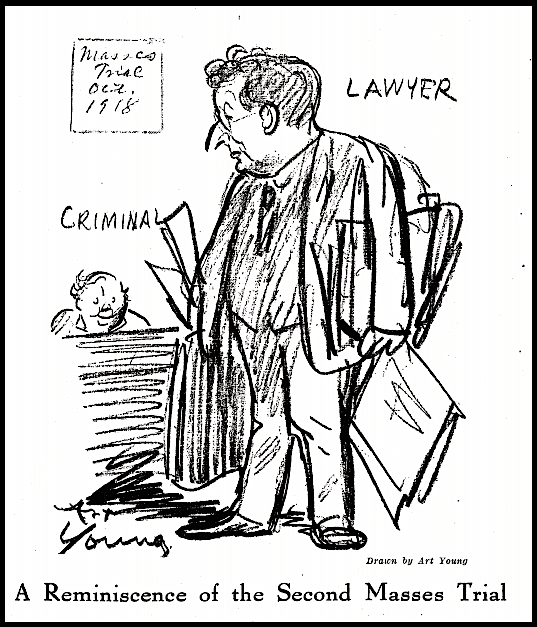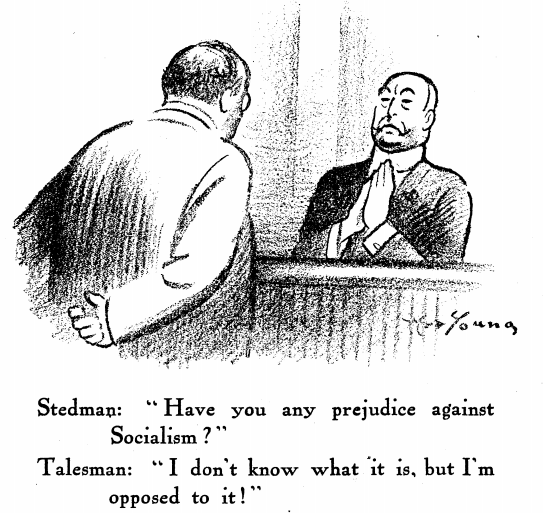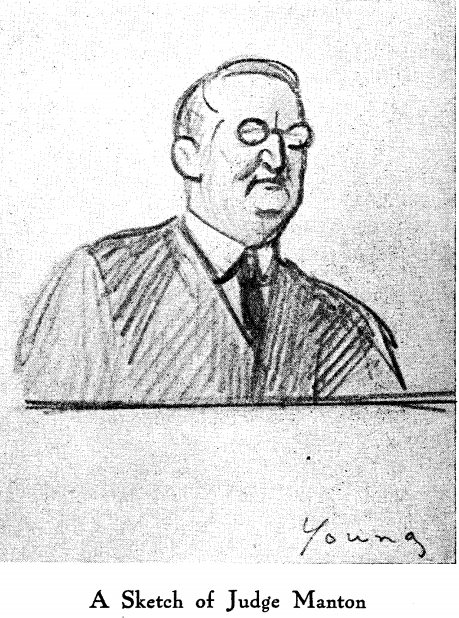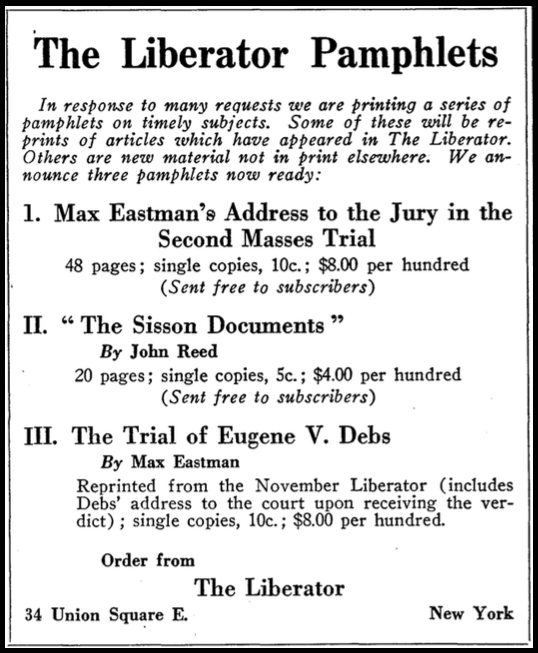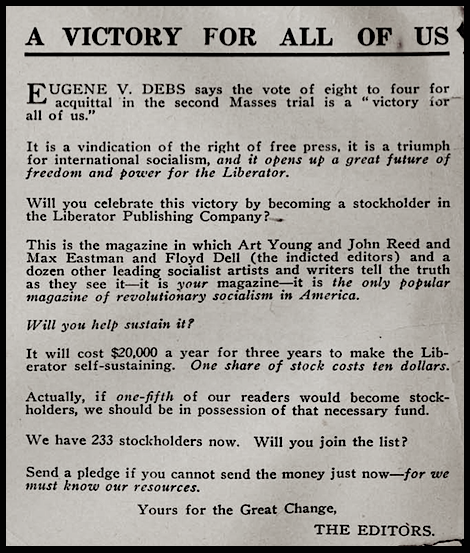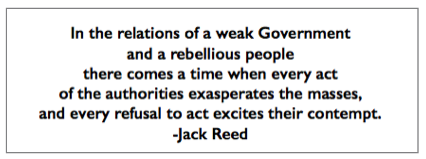
~~~~~~~~~~~~~~~~~~~~~~~~~~~~~~~~~~~~~~~~~~~~~
Hellraisers Journal – Friday December 27, 1918
New York, New York – Jack Reed & Art Young on Second Masses Trial
From The Liberator of December 1918:
-Defense Attorney Seymour Stedman by Art Young
SEYMOUR STEDMAN, attorney for the defense, in his eloquent summing up, referred as follows to the fact that the Masses editors asked an injunction compelling the Post Office to mail the very magazine for publishing which they were later indicted:
Do men who are committing a crime go into a Federal Court and face a District Attorney and ask the privilege of continuing it? A strange set of burglars! A strange set of footpads! A strange set o smugglers! A strange set of criminals! I ask Mr. Barnes to tell you when before in his experience, men in the City of New York came in and filed an appeal, opening all their proof and all their evidence and all their testimony and said, “if the Court please, we insist on the right to continue this deep, dark, infamous conspiracy, and have it sanctified by an advocate of the United States Court.” History finds no parallel that I know of in any criminal procedure which has ever taken place.
-John Reed on Second Masses Trial
About the Second Masses Trial
by John Reed
IN the United States political offenses are dealt with more harshly than anywhere else in the world. In the amendment to the Espionage Act [the Sedition Act] it is made a crime equivalent to manslaughter to “criticize the form of government.” The sentences in Espionage cases run anywhere from ten to twenty years at hard labor, with fines of thousands of dollars.
Nevertheless, in imposing sentences federal judges usually employ such words as these: “This is a free country. You enjoy here the rights of free speech and a free press. If you had committed this offense in any other country you would have been stood up against a wall and shot. This country protected you while you made a good living, and you were ungrateful. I am going to give you the limit, so that you may be an example to other malcontents and bad citizens.” All of which is, of course, quite untrue. The facts are the opposite of those stated.
The harsh punishment of political offenses breeds revolution, as other countries know. In this country Socialists are the chief political criminals, as they were in Germany before 1870. Bismarck could not suppress them there; Burleson and Gregory will not be able to do so here.
The second trial of the Masses case, although a political trial, differed in many respects from the conventional Espionage case. All the defendants were Americans, of old American lineage. The Judge, Martin Manton, allowed them a good deal of latitude in proving their intent. The jury was open to impressions. The case was tried in New York City, where the hysterical war spirit has never got the hold it has in the more provincial districts of the Middle West. And, finally, the tensity of patriotic feeling, kept at a stretch for more than a year, had begun to slacken…..
I was not present at the first Masses trial. In prospect, it did not seem to me very serious; but when I sat in that gloomy, dark-paneled court-room, and the bailiff with the brown wig beat the table and cried harshly, “Stand up!” and the Judge climbed to his seat, and it was announce, in the same harsh, menacing tone, “The Federal Court for the Southern District of New York is now open…”-I felt as if we were in the clutches of a relentless machinery, which would go on and grind and grind….
[District Attorney] Barnes had the last say. Both [Defense Attorneys] Stedman and Eastman, preceding him, outlined to the jury what Barnes would say in his summing-up. So well did they prognosticate his very language that when the District Attorney rose to speak he really had nothing new to say.
At the end of his speech he rung all the conventional changes on the patriotic motive, ending with the description of a young man, a lawyer of his acquaintance, who had died in the trenches abroad so that the world might be made free.
“Somewhere in France,” said Mr. Barnes, “he lies dead, and he died for you ad he died for me. He died for Max Eastman, he died for John Reed. He died for Merrill Rogers. His voice is but one of a thousand silent voices that demand that these men be punished….”
Art Young, who had been quietly sleeping at the counsel table, awoke at this point. He listened for a moment, with growing perplexity. Then he leaned across the table.
“Who’s he talking about?” asked Art. “Didn’t he die for me, too?”
The jury filed out about three. They took one ballot-to determine the guilt or innocence of the corporation-the Masses Publishing Company. Not guilty. Then arose a hard-faced old man, one of the jurors, an ex-City employee.
“I voted ‘not guilty’ for the corporation,” he said, “on condition that you would all vote ‘guilty’ for the individuals on each indictment….I am a Catholic. My faith bids me never to let a Socialist go if I once get my hands on him.”
There was only one more ballot. The jury disagreed-eight for acquittal, four against.
The second Masses trial was over. We await the third with equanimity…
-Ad for Liberator Pamphlets-Summation by Max Eastman
~~~~~~~~~~~~~~~~~~~~~~
SOURCES & IMAGES
Quote John Reed, Rebellious People, Ten Days, 1919
https://www.marxists.org/archive/reed/1919/10days/10days/ch3.htm
The Liberator Internet Archive
https://www.marxists.org/history/usa/culture/pubs/liberator/
The Liberator
(New York, New York)
-Dec 1918
https://www.marxists.org/history/usa/culture/pubs/liberator/1918/10/v1n10-dec-1918-liberator.pdf
See also:
I. “Max Eastman’s Address to the Jury in the Second Masses Trial
-In Defence of the socialist Position and the Right of Free Speech”
– Max Eastman Summation for the Defense,
–New York, New York, Friday October 4, 1918
http://fau.digital.flvc.org/islandora/object/fau%3A4329
Ad from pamphlet:
II. “The Sisson Documents” by John Reed
https://babel.hathitrust.org/cgi/pt?id=uva.x000388835;view=2up;seq=2
III. “The Trial of Eugene Debs” by Max Eastman
-With Debs’ Address to the Court on Receiving Sentence”
-by Max Eastman
http://debs.indstate.edu/e13t7_1918.pdf
Tag: Eugene Debs Statement to the Court of 1918
https://weneverforget.org/tag/eugene-debs-statement-to-the-court-of-1918/
~~~~~~~~~~~~~~~~~~~~~~~~~~~~~~~~~~~~~~~~~~~~~

